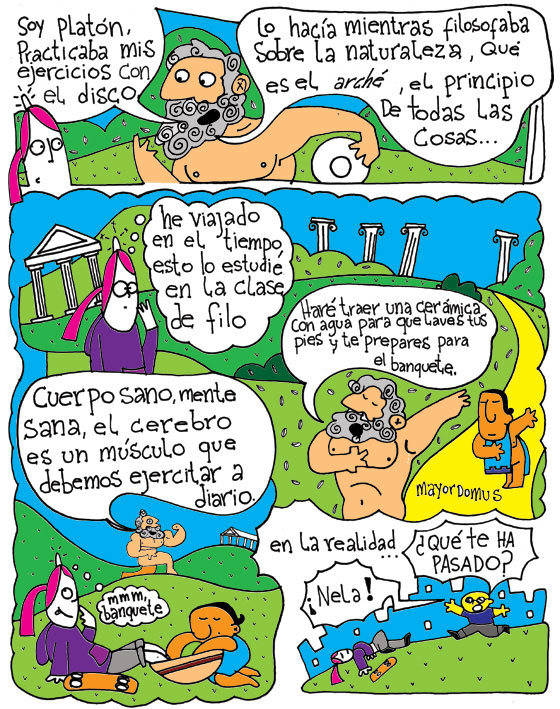Francisco Munguía Villalta is a Costa Rican artist who has been active in several artistic disciplines. He makes cartoons, paintings, murals, ceramics, sculptures, engravings and animations, yet all his endeavors show their creator's sense of humor, parody, wit and social consciousness. As a cartoonist, he is best known for his daily newspaper strip 'Pantys', which ran in La Nación in 2001-2002, and for his comical 'Calcamunguías', a series of free-spirited cartoons/paintings full of wordplay, parody and pop culture references.
'Pantys'.
Early life and influences
Born in San José, Munguía developed a rich fantasy as a kid and keen interest in drawing and coloring. Growing up, he cultivated his love for cartoons, stickers, action figures, video games and collectible cards, especially the 'Garbage Pail Kids' series by Topps. He attended high school in Curridabat and Alajuelita, before enrolling at the University of Costa Rica to study Plastic Arts. He joined the ceramics workshop, and also took lessons in sculpting. He later also picked up painting and engraving. One would generally not associate these specific art forms with puns or parody, but Munguía sees humor as an important part of his personality. From the start he has incorporated jokes, dream-like settings, imaginative characters or a deeper meaning in all his works of art. To him, he is a cartoonist who merely applies different techniques. The artist ranks John Pound, Matt Groening and Quino as major inspirations for his colorful work, but he also underwent influences from painters like Pablo Picasso and Gustav Klimt, as well as folk art and ancient mosaics.
Pantys
While still at the university and a brand new member of the La Zarigüeya Association of Graphic Humorists, Munguía invented his cartoon character 'Pantys' (1997). Between 1997 and 1999, the character entertained readers in 12-page black-and-white zines, which the author photocopied at the university and sold for about 100 colonnes each. By 2000 Munguía was hired as an illustrator for VIVA magazine by the daily newspaper La Nación. He then managed to get his strip published in the newspaper, serialized between the period 2001-2002. Ever since its print publication ended, Munguía has regularly made new episodes as webcomics. 'Pantys' is a strip in which practically everything is possible. The main character looks like a superhero with a panty over his head, while the other characters are either humans, animals, or Cubist fantasy creatures, including a political pizza slice called Fofo Pizza Quesofort and the devilish El Pisuicas. The priest El Padre Simón, who spearheaded the Saturday comic strips, was one of the most controversial characters, often used by the cartoonist to parody or criticize the church. While 'Pantys' appeared on the entertainment page of La Nación, Munguía didn't shy away from social criticism, political and religious satire and current affairs, resulting in both praise and hatred from his readership.
Literal humor about a Hawaiian pizza slice and a parody of The Beatles' 'Sgt. Pepper's Lonely Hearts Club Band' album.
Calcamunguías
When 'Pantys' came to an end in La Nación, Munguía embarked upon a new project, 'Calcamunguías' (2002), a series of independent paintings and drawings, reminiscent of the collectable cards from the artist's childhood. The artist prints them on vinyl, T-shirts and ceramic tiles, but they can also be watched in galleries or online at Toonpool.com. The drawings are all products of Munguías' vivid imagination, and vary from parodies of pop culture and "high" art to literal interpretations of expressions and titles of musical albums.
Isaac
Another comic strip created by Munguía is the gag comic 'Isaac' (2003-2005), which appeared in Arcadio.
Other artistic activities
A true multimedia artist, Francisco Munguía has made award-winning animated shorts based on his creations, as well as a musical playlist by DJ Pulp, one of the characters from 'Pantys'. He has used his parodies of famous paintings in a video game, where he mixes his humor with education about art. Over 80 of Munguía's own humorous paintings can be seen as murals in public spaces in the San José area, while his artwork has been printed in newspapers and magazines like Tiempos de Mundo, Cartago en la Nación, Tiempo Libre, Revista Espacios, Fuera del Paraíso, La Pichinga and Solo Nosotras.
'Chichotes', a back-up strip for a Bachelor in Philosophy book from Mexico (2006).
As a commercial artist, Munguía has drawn comics about public telephones for the Costa Rican Institute of Electricity (2008), an informative strip about asthma which appeared in newspapers throughout Central America and a back-up strip for a Mexican book about philosophy studies. Last but not least, animal welfare is a recurring theme in Munguía's work, as the artist and his wife have opened their home as a shelter for over 20 stray dogs.
Francisco Manguía in front of one of his murals (2017, © CRHoy.com).
munguiahistorietascostarricenses.blogspot.com
calcamunguiasdelmundo.blogspot.com










